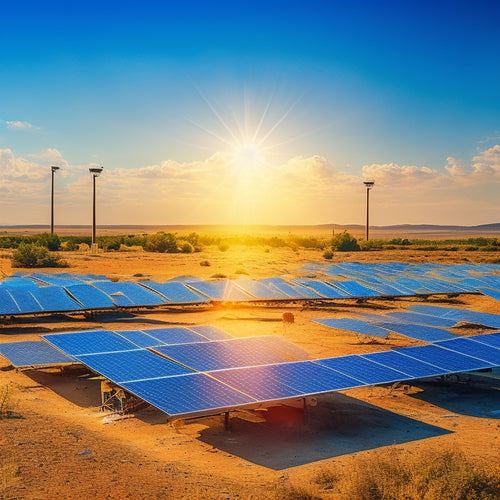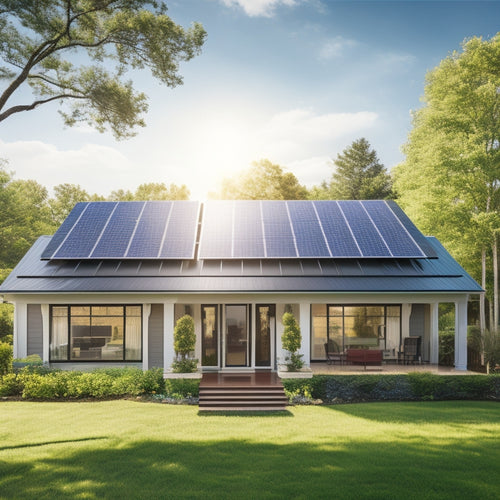
Residential Solar Power
Share
By shifting to residential solar power, you can greatly reduce your monthly energy bills, potentially eliminating them entirely, while also contributing to a more sustainable future by generating clean energy and reducing your reliance on traditional power sources. You'll benefit from financial incentives like the Federal Solar Investment Tax Credit and state-specific programs, which can help offset the upfront installation costs. With solar power, you'll enjoy predictable energy expenses, increased home value, and long-term financial stability. As you investigate the benefits of solar energy, you'll uncover how to optimize your system's performance, maximize energy harvest, and access the full potential of going solar.
The Essentials
- Residential solar power can lead to significant monthly savings and potentially eliminate energy costs entirely with a well-designed solar system.
- The Federal Solar Investment Tax Credit (ITC) offers a 26% credit of the total installation cost, and additional incentives may be available.
- Solar power reduces energy consumption, leading to lower electricity bills and predictable energy expenses, which eliminate uncertainty from rising energy costs.
- Micro-inverters optimize performance by converting DC to AC power at the panel level, enhancing energy harvesting capabilities and improving overall system efficiency.
- A thorough roof assessment is crucial for optimal performance, identifying obstructions that can reduce energy output and addressing them during installation.
Renewable Energy Tax Credits
When you install a residential solar power system, you're eligible for federal incentives that can greatly reduce your upfront costs.
By embracing a cleaner, more sustainable future with solar power and battery storage solutions Renewable Energy Solutions, you'll not only reduce your electricity bills but also contribute to a healthier environment for future generations.
You'll want to take advantage of the Solar Investment Tax Credit (ITC), which allows you to claim a credit of 26% of the total cost of your system.
Additionally, you may be eligible for state credits, which vary by location, but can provide further financial benefits.
Federal Incentives Available
One of the most attractive federal incentives available to homeowners investing in residential solar power is the Renewable Energy Tax Credit. This incentive allows you to claim a tax credit of up to 26% of the total cost of your solar panel system installation.
That's a considerable savings, especially considering the cost of solar panels and installation can range from $15,000 to $30,000 or more. By switching to solar roofing solutions, homeowners can increase their home's value and appeal, making it a more attractive selling point should they decide to move.
Additionally, solar panels can greatly lower monthly electricity bills by utilizing free, renewable energy from the sun.
In addition to the Renewable Energy Tax Credit, there are other federal incentive programs that can help offset the cost of going solar. You may be eligible for installation grants, which can provide additional funding to help cover the upfront costs of solar panel installation.
These grants are typically available through government agencies or non-profit organizations that support renewable energy initiatives.
State Credits Offered
Thirty-eight states currently offer their own renewable energy tax credits, providing additional incentives for homeowners to invest in residential solar power.
These state incentives are designed to encourage you to adopt clean energy solutions, reducing your reliance on fossil fuels and mitigating climate change. By installing solar panels on your property, you can take advantage of these financial benefits, which can greatly offset the upfront costs of going solar.
In addition, with a home battery storage system, you can store excess energy generated by your solar panels and reduce your reliance on the grid during power outages. State credits can be claimed in addition to federal incentives, further increasing your savings.
The amount and type of credits vary by state, with some offering refundable credits, while others provide non-refundable credits. You'll need to research the specific programs available in your state to determine the financial benefits you're eligible for.
Some states also offer additional incentives, such as property tax exemptions or sales tax exemptions, which can further reduce your costs. By leveraging these state credits, you can maximize your return on investment and enjoy the freedom that comes with generating your own clean energy.
Zero Energy Bills
As you shift to residential solar power, you'll start saving money monthly on your energy bills.
By utilizing photovoltaic cells, you can maximize your energy output and reduce your reliance on traditional energy sources.
With a well-designed solar panel system, you can eliminate your energy costs altogether, enjoying the financial benefits of zero energy bills.
Save Money Monthly
Switching to residential solar power can literally take a load off your wallet, freeing up hundreds of dollars in your budget every month. By capturing the energy from the sun, you'll greatly reduce your energy consumption, which translates to lower electricity bills.
With solar power, you'll be generating your own clean energy, reducing your reliance on the grid and the associated costs.
When you plan your budget, you'll appreciate the predictability of your energy expenses. With a fixed monthly payment for your solar panel system, you'll know exactly how much you'll be paying, eliminating the uncertainty of rising energy costs.
This stability allows you to allocate your funds more efficiently, freeing up resources for other important aspects of your life. By saving money monthly, you'll have more freedom to pursue your passions and goals, unencumbered by the burden of high energy bills.
With residential solar power, you'll be in control of your energy consumption and budget planning, enjoying the financial freedom you deserve.
Eliminate Energy Costs
With residential solar power, you're not just reducing your energy bills - you're ready to eliminate them altogether.
Imagine the freedom that comes with energy independence, where you're no longer bound to the grid and its ever-fluctuating prices.
With a solar power system, you can generate your own clean energy, reducing your reliance on traditional utilities and saving you money in the long run.
Micro-inverters Boost Efficiency
You'll find that micro-inverters play an essential role in optimizing your residential solar power system's performance.
By converting DC power to AC power at the individual panel level, micro-inverters enable you to harvest more energy from your solar array, especially when paired with off-grid systems that provide backup power during outages.
Additionally, micro-inverters are often used in conjunction with deep cycle batteries to store excess energy for later use.
This setup also allows for enhanced system monitoring, giving you greater understanding into your energy production and consumption.
Improved Energy Harvest
Micro-inverters are revolutionizing residential solar power systems by enhancing efficiency and energy harvesting capabilities. You can now maximize your energy production with micro-inverters, which optimize energy output at the individual panel level. This means that even if one panel is shaded or damaged, the others will continue to produce energy at their maximum capacity.
Micro-inverters also enable you to store excess energy for later use, reducing your reliance on the grid and providing a backup during power outages. This is especially important for those who value energy independence and want to reduce their carbon footprint.
| Feature | Micro-inverter Advantage |
|---|---|
| Energy Harvesting | Optimizes energy output at the individual panel level |
| Energy Storage | Enables storage of excess energy for later use |
| Grid Integration | Seamlessly integrates with the grid, providing a backup during power outages |
With micro-inverters, you can rest assured that your residential solar power system is operating at its best, providing you with a reliable source of clean energy and a path to energy freedom.
Enhanced System Monitoring
One of the most significant benefits of micro-inverters is their ability to provide real-time monitoring of your residential solar power system's performance.
With real-time analytics, you can track your system's energy production, identify potential issues, and enhance its performance. This level of monitoring enables you to make data-driven decisions to maximize your energy harvest.
Micro-inverters allow you to monitor each panel's performance individually, which is essential for identifying underperforming panels.
This information enables you to take corrective action, such as cleaning or replacing panels, to guarantee peak energy production.
Furthermore, micro-inverters can detect and alert you to potential issues, such as shading or electrical faults, allowing you to address them promptly.
Assess Your Roof's Shading
When evaluating your roof's shading, you'll need to identify obstructions that can block sunlight from reaching your solar panels, such as skylights, vents, and chimneys.
Additionally, it's crucial to contemplate the impact of surrounding terrain features, such as off-grid energy, on the shading pattern.
You'll also need to analyze the shading pattern on your roof, factoring in the time of day and year, as well as the surrounding environment.
Roof Obstructions to Consider
As you prepare to harness the power of the sun, it is vital to assess your roof's shading and identify any obstructions that could affect the performance of your residential solar power system. Roof obstructions can greatly reduce the energy output of your solar panels, making it necessary to take them into account during the installation process.
| Obstruction Type | Impact on Solar Panel Performance |
|---|---|
| Chimneys | Reduces energy output by 10-20% due to shading |
| Skylights | Blocks direct sunlight, reducing energy output by 5-10% |
| Vents | Creates shading, reducing energy output by 5-10% |
| Tree Branches | Reduces energy output by 20-50% due to extensive shading |
When evaluating your roof, think about the roof orientation and installation angles to maximize energy output. Confirm that your solar panels are installed at an angle that minimizes shading from obstructions. By identifying and addressing these obstructions, you can optimize your residential solar power system's performance and enjoy the freedom of generating your own clean energy.
Shading Pattern Analysis
Conducting a thorough shading pattern analysis is essential to identifying areas of your roof that receive partial or complete shade, which can greatly impact your solar panel system's energy output.
This analysis will help you determine the amount of shade your roof receives throughout the day and year, considering factors like tree coverage, neighboring buildings, and roof obstructions.
You'll want to assess your roof's shading patterns during different times of day and year to get an accurate depiction of your solar energy potential.
A shading analysis can be done using specialized software or by working with a solar panel professional who can conduct a site assessment.
They'll use tools like a solar pathfinder or a shading analysis app to measure the shade intensity and duration on your roof.
Higher Energy Harvest Rate
You'll want to maximize your energy harvest rate by leveraging efficient panel technology that converts sunlight into electricity at a higher rate.
By selecting panels with high-efficiency ratings, you can generate more power per hour of sunlight, resulting in greater energy savings.
With advancements in panel technology, you can now achieve higher energy harvest rates than ever before.
Efficient Panel Technology
High-efficiency solar panels equipped with advanced photovoltaic cells can greatly enhance your energy harvest rate.
These innovative panels boast improved conversion rates, allowing you to generate more electricity from the same amount of sunlight. By incorporating state-of-the-art technologies, such as bifacial panels and multi-junction cells, you can substantially increase your energy output. This means you'll be able to power more of your home's appliances and systems, reducing your reliance on the grid and your energy bills.
When combined with energy storage solutions, high-efficiency solar panels can provide a reliable and consistent source of power.
This is especially important for homeowners who want to maximize their energy independence. By storing excess energy generated during the day for use during the night or on cloudy days, you'll be able to enjoy a steady supply of clean, renewable energy.
With the latest solar panel innovations, you can take control of your energy needs and enjoy the freedom that comes with generating your own power.
Frequently Asked Questions
How Long Do Residential Solar Panels Typically Last?
You'll find that solar panels typically last around 25-30 years, with a gradual decline in solar energy efficiency over time, but maintaining at least 80% of their initial performance after 25 years, ensuring a reliable source of clean energy for your freedom-seeking lifestyle.
Can I Install Solar Panels on a Metal Roof?
You're wondering if you can install solar panels on a metal roof? Absolutely! In fact, metal roofs offer numerous benefits, including increased durability and wind resistance, but you'll need to take into account specialized installation considerations, like non-penetrating clamps and waterproofing.
Are Solar Panels Affected by Hail or Extreme Weather?
You're wondering if solar panels can withstand harsh weather conditions. Rest assured, most modern panels are designed with hail resistance in mind and can survive extreme weather, including heavy rain, strong winds, and even golf-ball-sized hailstones.
Can I Sell Excess Energy Back to the Grid?
You can sell excess energy back to the grid through net metering benefits, where utilities measure your production and consumption, and energy buyback policies, which allow you to offset your bills or even earn credits.
Do Solar Panels Require Regular Maintenance?
You'll want to perform routine checks to verify peak performance; this involves solar panel cleaning to remove debris and inverter maintenance to prevent overheating, assuring your system runs efficiently and effectively, giving you the freedom you desire.
Final Thoughts
As you flip the switch to residential solar power, imagine a tidal wave of savings crashing down on your energy bills! With renewable energy tax credits, you'll be swimming in a sea of discounts. Micro-inverters will enhance efficiency, and a thorough assessment of your roof's shading will guarantee maximum energy harvesting. The result? Zero energy bills, and a higher energy harvest rate that will leave you basking in the warmth of a smart investment.
Related Posts
-

Building an Emergency Backup Solar Power System in 5 Essential Steps
Building an emergency backup solar power system involves five key steps. First, assess your daily energy needs to ide...
-

What Happens Without a Charge Controller in Solar Panels
Without a charge controller in your solar panel system, you risk overheating batteries due to overcharging, which can...
-

Home Solar Installation Cost
You're considering installing solar panels on your home, and the upfront cost is likely the biggest hurdle standing i...


